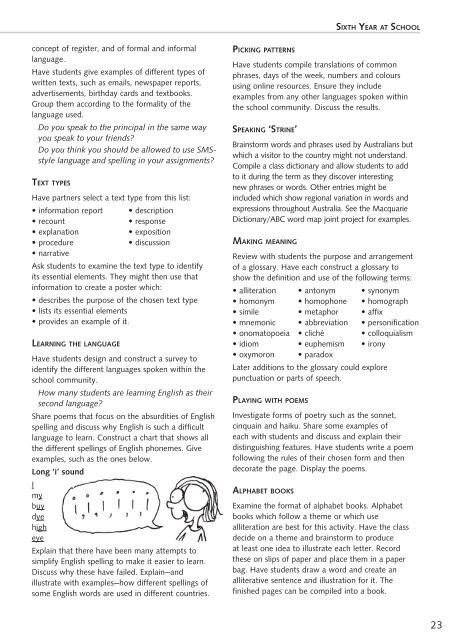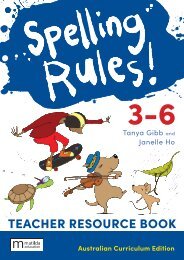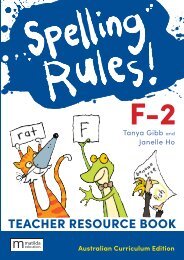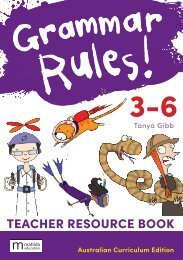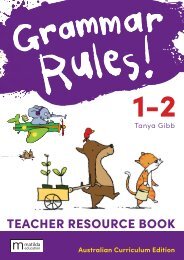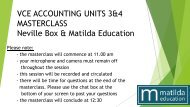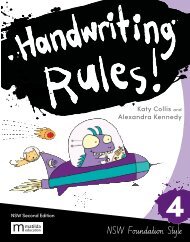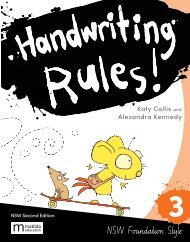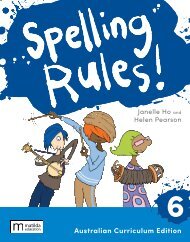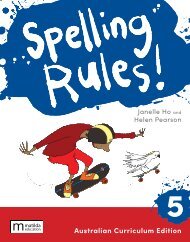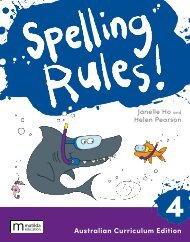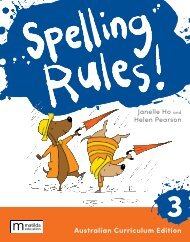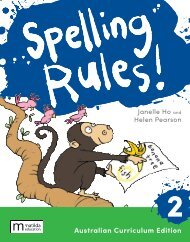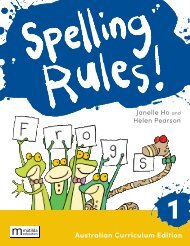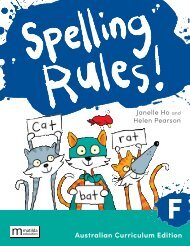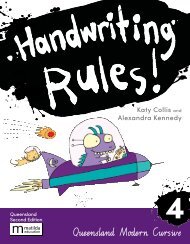All You Need to Teach - Info Literacy 10+
Create successful ePaper yourself
Turn your PDF publications into a flip-book with our unique Google optimized e-Paper software.
Sixth Year at School<br />
concept of register, and of formal and informal<br />
language.<br />
Have students give examples of different types of<br />
written texts, such as emails, newspaper reports,<br />
advertisements, birthday cards and textbooks.<br />
Group them according <strong>to</strong> the formality of the<br />
language used.<br />
Do you speak <strong>to</strong> the principal in the same way<br />
you speak <strong>to</strong> your friends?<br />
Do you think you should be allowed <strong>to</strong> use SMSstyle<br />
language and spelling in your assignments?<br />
Text types<br />
Have partners select a text type from this list:<br />
• information report<br />
• recount<br />
• explanation<br />
• procedure<br />
• narrative<br />
• description<br />
• response<br />
• exposition<br />
• discussion<br />
Ask students <strong>to</strong> examine the text type <strong>to</strong> identify<br />
its essential elements. They might then use that<br />
information <strong>to</strong> create a poster which:<br />
• describes the purpose of the chosen text type<br />
• lists its essential elements<br />
• provides an example of it.<br />
Learning the language<br />
Have students design and construct a survey <strong>to</strong><br />
identify the different languages spoken within the<br />
school community.<br />
How many students are learning English as their<br />
second language?<br />
Share poems that focus on the absurdities of English<br />
spelling and discuss why English is such a difficult<br />
language <strong>to</strong> learn. Construct a chart that shows all<br />
the different spellings of English phonemes. Give<br />
examples, such as the ones below.<br />
Long ‘i’ sound<br />
I<br />
my<br />
buy<br />
dye<br />
high<br />
eye<br />
Explain that there have been many attempts <strong>to</strong><br />
simplify English spelling <strong>to</strong> make it easier <strong>to</strong> learn.<br />
Discuss why these have failed. Explain—and<br />
illustrate with examples—how different spellings of<br />
some English words are used in different countries.<br />
Picking patterns<br />
Have students compile translations of common<br />
phrases, days of the week, numbers and colours<br />
using online resources. Ensure they include<br />
examples from any other languages spoken within<br />
the school community. Discuss the results.<br />
Speaking ‘Strine’<br />
Brains<strong>to</strong>rm words and phrases used by Australians but<br />
which a visi<strong>to</strong>r <strong>to</strong> the country might not understand.<br />
Compile a class dictionary and allow students <strong>to</strong> add<br />
<strong>to</strong> it during the term as they discover interesting<br />
new phrases or words. Other entries might be<br />
included which show regional variation in words and<br />
expressions throughout Australia. See the Macquarie<br />
Dictionary/ABC word map joint project for examples.<br />
Making meaning<br />
Review with students the purpose and arrangement<br />
of a glossary. Have each construct a glossary <strong>to</strong><br />
show the definition and use of the following terms:<br />
• alliteration • an<strong>to</strong>nym • synonym<br />
• homonym • homophone • homograph<br />
• simile • metaphor • affix<br />
• mnemonic • abbreviation • personification<br />
• onoma<strong>to</strong>poeia • cliché • colloquialism<br />
• idiom • euphemism • irony<br />
• oxymoron • paradox<br />
Later additions <strong>to</strong> the glossary could explore<br />
punctuation or parts of speech.<br />
Playing with poems<br />
Investigate forms of poetry such as the sonnet,<br />
cinquain and haiku. Share some examples of<br />
each with students and discuss and explain their<br />
distinguishing features. Have students write a poem<br />
following the rules of their chosen form and then<br />
decorate the page. Display the poems.<br />
Alphabet books<br />
Examine the format of alphabet books. Alphabet<br />
books which follow a theme or which use<br />
alliteration are best for this activity. Have the class<br />
decide on a theme and brains<strong>to</strong>rm <strong>to</strong> produce<br />
at least one idea <strong>to</strong> illustrate each letter. Record<br />
these on slips of paper and place them in a paper<br />
bag. Have students draw a word and create an<br />
alliterative sentence and illustration for it. The<br />
finished pages can be compiled in<strong>to</strong> a book.<br />
23


